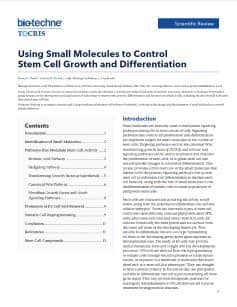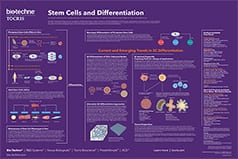MYC
MYC (Myc proto-oncogene protein) is a nuclear protein that acts as a transcription factor, driving cell growth, self-renewal, proliferation, differentiation and death under normal conditions. Deregulation of MYC is associated with the initiation and maintenance of many cancers.
MYC Inhibitors |
|
|---|---|
| Cat. No. | Product Name / Activity |
| 4406 | 10058-F4 |
| Inhibits c-Myc-Max dimerization | |
| 5306 | KJ Pyr 9 |
| High affinity Myc inhibitor | |
MYC (Myc proto-oncogene protein) is a nuclear protein that acts as a transcription factor, driving cell growth, self-renewal, proliferation and differentiation under normal conditions. MYC belongs to a family of transcription factors that includes N-Myc and L-Myc, and is a subgroup of the larger class of bHLHZ (basic-helix loop-helix leucine zipper domain) transcription factors. MYC heterodimerizes with MAX, enabling DNA binding and transcriptional regulation. MYC is the endpoint for numerous signal transduction pathways, such as MAPK and PI 3-kinase, and acts to integrate different cellular signals.
MYC-MAX is able to bind to 10-15% of the human genome, regulating both protein-coding and non-protein-coding genes. Many of the genes that MYC regulates are involved in the cell cycle and metabolism, including cyclins, CDK4, Cdc25 and more. MYC can also stimulate differentiation and has a crucial role in apoptosis. MYC is also of interest in stem cell research owing to the critical role of the protein in self-renewal and pluripotency, and was originally used by Takahashi and Yamanaka (2006) in combination with other transcription factors, Oct4, Sox2 and Klf4, to reprogram mature cells to become pluripotent.
MYC proteins are very unstable, having a half-life of around 20-30 minutes in many normal cells. The stability of MYC is controlled by numerous ubiquitin ligases, and increased stability of MYC has been shown to be associated with its deregulation and increased tumorigenicity. Phosphorylation at Ser62 increases MYC stability, so prolonging its actions, whereas phosphorylation by GSK-3 at Thr58 promotes MYC ubiquitination and proteasomal degradation. A mutated version of Myc, the gene encoding MYC, is found in many cancers, which causes the gene to be constitutively expressed.
Literature for MYC
Tocris offers the following scientific literature for MYC to showcase our products. We invite you to request* your copy today!
*Please note that Tocris will only send literature to established scientific business / institute addresses.
Cancer Metabolism Research Product Guide
This product guide reviews some of the main areas in cancer metabolism research and lists around 150 products that can be used to investigate metabolic pathways in cancer including:
- Glycolysis
- Tricarboxylic Acid Cycle
- Lipidogenesis
- 1C Metabolism and Nucleic Acid Synthesis
- Drivers of Metabolic Reprogramming
- pH and Redox Balance
Stem Cells Scientific Review
Written by Kirsty E. Clarke, Victoria B. Christie, Andy Whiting and Stefan A. Przyborski, this review provides an overview of the use of small molecules in the control of stem cell growth and differentiation. Key signaling pathways are highlighted, and the regulation of ES cell self-renewal and somatic cell reprogramming is discussed. Compounds available from Tocris are listed.
Pathways for MYC
MAPK Signaling Pathway
The mitogen-activated protein kinase pathway evokes an intracellular signaling cascade in response to extracellular stimuli such as heat and stress. It can influence cell division, metabolism and survival.MYC Gene Data
| Gene | Species | Gene Symbol | Gene Accession No. | Protein Accession No. |
|---|---|---|---|---|
| MYC | Human | MYC | NM_002467 | P01106 |
| Mouse | Myc | NM_010849 | P01108 | |
| Rat | Myc | NM_012603 | P09416 | |
| MYCN | Human | MYCN | NM_005378 | P04198 |
| Mouse | Mycn | NM_008709 | P03966 | |
| Rat | Mycn | NM_001013096 | Q63379 | |
| MYCL | Human | MYCL | NM_001033082 | P12524 |
| Mouse | Mycl | NM_008506 | P10166 | |
| Rat | Mycl | NM_001191763 | NP_001178692 |



